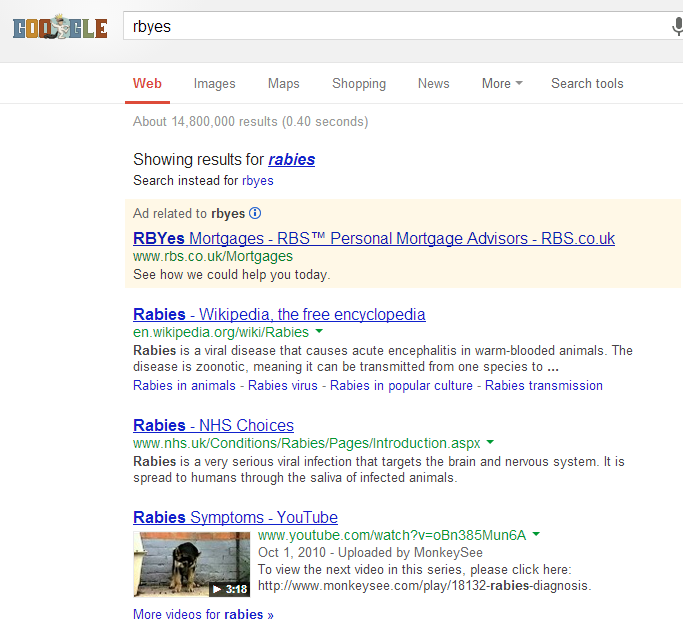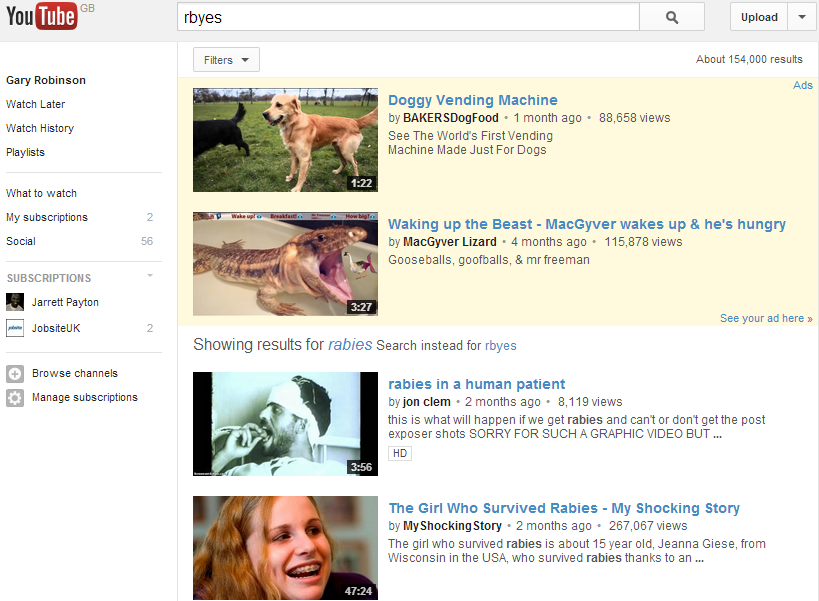In my previous post, I talked about how Natwest’s new ad campaign fell short because TV and digital were not integrated. The TV advert creative contained the call to action ‘Search NatYes‘ yet NatWest did not have a listing in the organic results for that search phrase. They effectively paid twice by running PPC ads to try convert the visitor.
The post generated a lot of shares, comments on the blog and some twitter conversations. Whilst reading further around the subject I discovered a couple of interesting things.
Firstly, Natwest are owned by RBS and it transpires that the same advert has been shot twice – once for NatWest and once for RBS – with different accented boy actors to cater for different regional markets.
Both use a similar call to action in the TV ads – either ‘search NatYes‘ or ‘Search RBYes‘.
Secondly, as you’d expect given the same marketers & agency, both campaigns experience similar digital integration problems. However, to compound it, the RBYes campaign has encountered another unfortunate issue.
When you type in ‘RBYes‘ to Google, the search engine has tried to helpfully correct what it believes to be a misspelling. So instead of information on RBS mortgages you get…
Rabies.

I’m guessing this isn’t what the bank wants prospective customers to see.
There is another link that says ‘search instead for rbyes‘ but it is below the adjusted search term and much smaller. By this point the searcher has already noticed the links to rabies information and the YouTube video thumbnails of unfortunate canines.
To RBS’ credit, they do have a PPC ad present in the top slot, albeit surrounded by less appealing links.
In my Natwest NatYes post I was critical regarding the lack of a listing atop the organic results. In that instance it would have strengthened their position, reduced their dependency on a 24/7 PPC presence and protected against guerrilla shenanigans by competitors. With the RBYes campaign, an optimised landing page in the organic listings is again a necessity but it wouldn’t help one bit with this particular issue.
Now, you could defend RBS by saying who could have predicted this? And that may well be a fair comment. However, I can’t help but feel this could have been discovered a lot earlier in the planning and preparation stage – before the ads and tag lines were signed off. Surely someone typed it into Google when the idea was to proposed to include ‘search RBYes’ in the TV advert?
Though tangential, this brings to mind the classic mistakes companies have experienced when trying to launch products into foreign markets without doing thorough research into the local translation of the brand name. Whilst amusing to read, it can be embarrassing for the business and costly to remedy.
So what happens if you click the ‘search instead for rbyes‘ link?
Thankfully a RBYes mortgage page appears near the top of the organic listings (as well as a PPC ad). Over the course of the past couple of days I’ve watched it move up from the bottom of page one to the number two position behind a Youtube video. I’m sure it’ll only be a matter of time before it takes the top slot, as the algorithm adjusts.
Incidentally, I performed the same search for ‘rbyes‘ on Youtube to find the TV advert video to embed in this post and the same unfortunate substitution occurs:

So what are the lessons to take from this for your own campaigns?
Preparation and detail. The planning stage of a campaign is crucial, especially when you need to account for customer journeys across multiple channels and platforms. You have to map out exactly where you need to be, with which assets and with a clear, consistent message. All that requires an eye for detail. The big themes, the messaging, the story, all are obviously essential for a campaign, but it’s the little details that hold it together and influence the outcome.